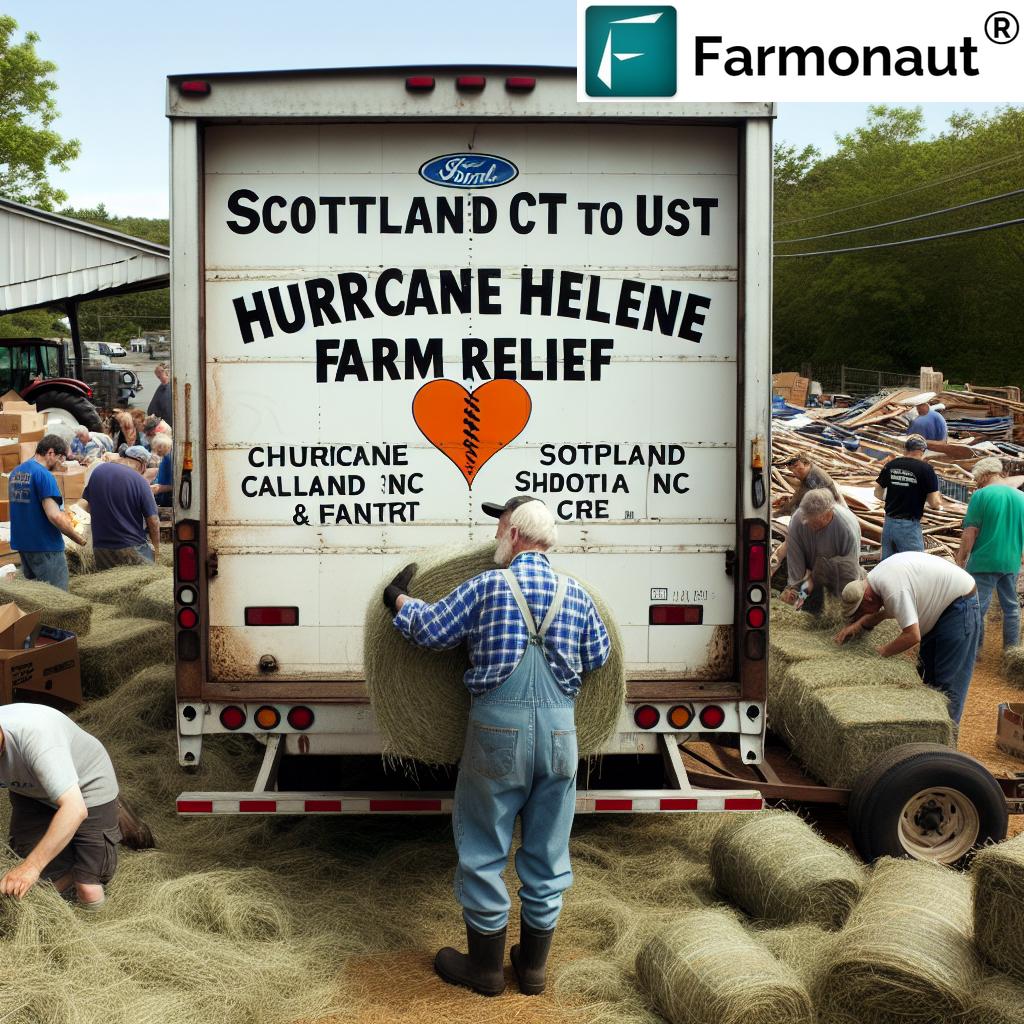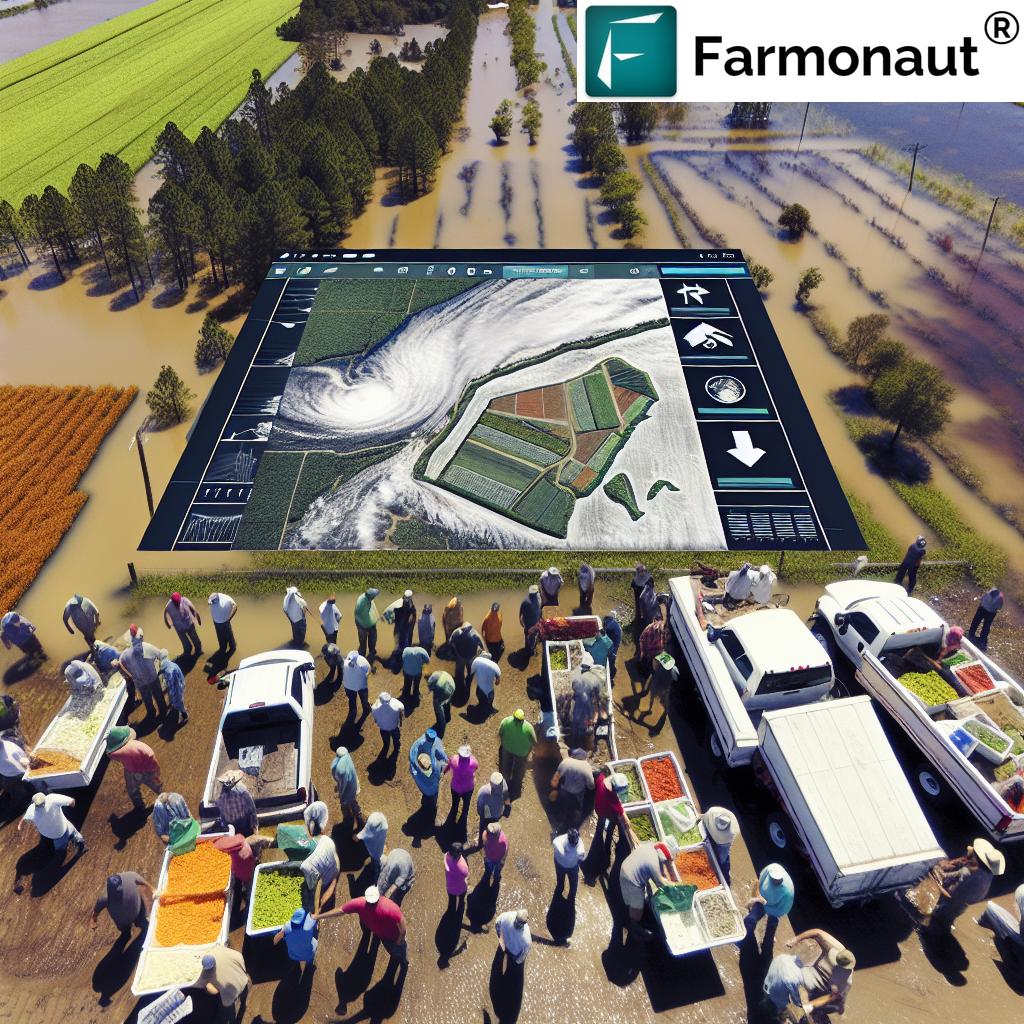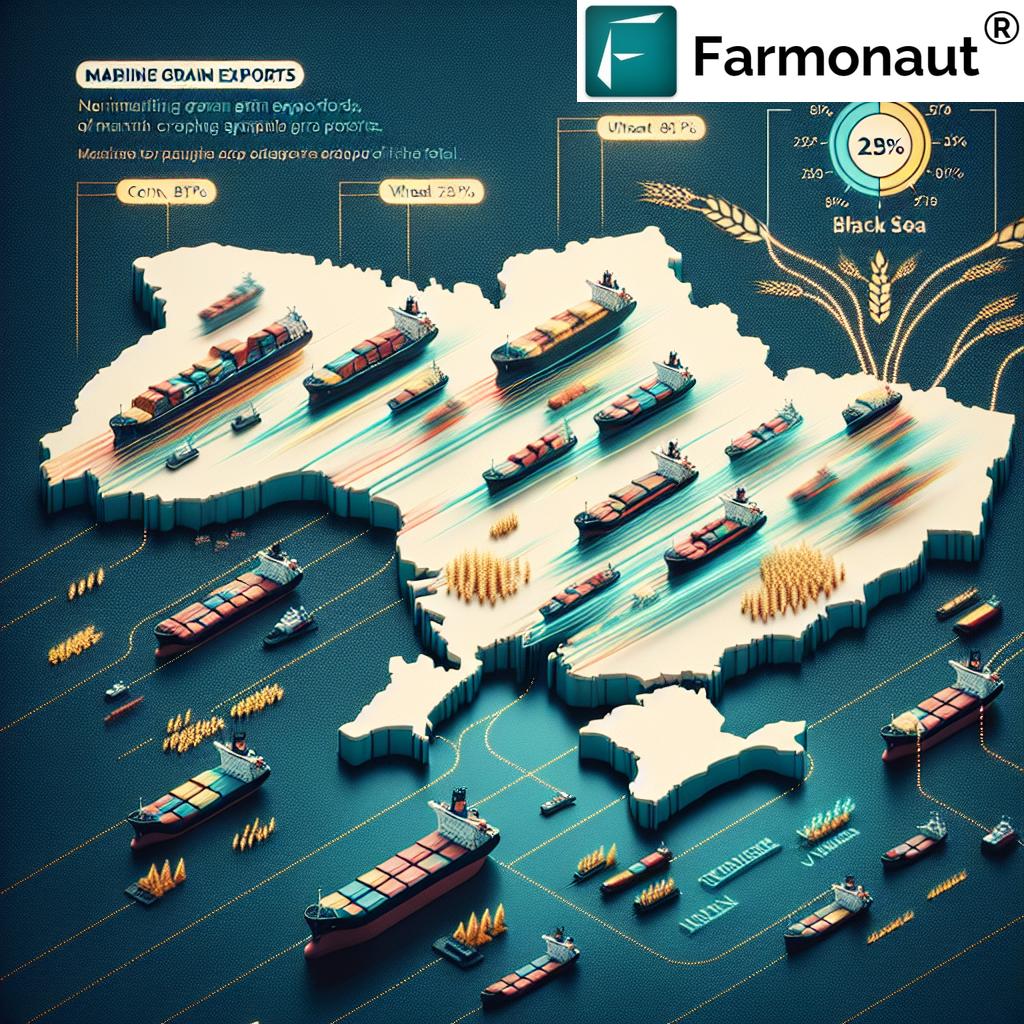Urgent: Scottish Farmers’ Heroic Mission to Rescue Hurricane-Ravaged North Carolina Farms – A Tale of Agricultural Solidarity
In an extraordinary display of rural community disaster response and agricultural solidarity, Scottish farmers in Scotland, Connecticut, have launched a massive Hurricane Helene farm relief effort to aid their fellow farmers in North Carolina. This heartwarming story of farmer-to-farmer support showcases the resilience and compassion of the agricultural community in times of crisis.

The Hurricane’s Devastating Impact
Hurricane Helene, a powerful storm that recently battered the coast of North Carolina, has left a trail of destruction in its wake. The hurricane’s impact on agriculture has been particularly severe, with small farmers bearing the brunt of the damage. Crops have been destroyed, livestock endangered, and critical farm infrastructure decimated, leaving many rural communities in dire need of assistance.
As news of the devastation spread, the farming community in Scotland, Connecticut, sprang into action. Led by the indomitable Kate Prokop, these Scottish farmers have mobilized an impressive grassroots effort to provide North Carolina small farmers assistance in their time of need.
A Community United in Support
The Scotland Connecticut farmers aid initiative has quickly gained momentum, with local businesses and community members rallying behind the cause. This remarkable display of rural community disaster response solidarity has resulted in an outpouring of donations and support.
- Livestock feed donations: Hundreds of hay bales and tons of cattle feed have been collected to help sustain animals affected by the hurricane.
- Farm equipment donations: Essential tools such as generators, chainsaws, and other vital machinery have been gathered to assist in the recovery efforts.
- Monetary contributions: Local businesses and individuals have made significant financial donations to support the transportation and distribution of supplies.
This collaborative effort not only provides immediate hurricane farm relief but also strengthens the bonds between farming communities across state lines. As Kate Prokop eloquently stated, “When disaster strikes, farmers stand together. We’re not just sending supplies; we’re sending hope and solidarity to our fellow farmers in North Carolina.”
The Logistics of Hope
Organizing such a massive relief effort is no small feat. The Scottish farmers have been working tirelessly to coordinate the collection, packaging, and transportation of supplies. Plans are underway to send multiple tractor-trailers filled with essential items to the affected areas in North Carolina.
This grassroots initiative demonstrates the incredible agricultural supply chain resilience that can be achieved when communities come together. By leveraging their networks and resources, these farmers are creating a lifeline for their counterparts in need.

The Critical Nature of Farmer-to-Farmer Hurricane Assistance
The importance of this farmer-to-farmer support cannot be overstated. In the aftermath of Hurricane Helene, many North Carolina farmers are facing difficult decisions due to food shortages and damaged infrastructure. The donations from Scotland, Connecticut, are crucial for both livestock survival and overall farm recovery.
Agricultural disaster recovery support of this nature goes beyond mere material aid. It provides emotional support and a sense of community that is invaluable during times of crisis. As one North Carolina farmer noted, “Knowing that our fellow farmers hundreds of miles away care enough to help us in our darkest hour gives us the strength to keep going.”
A Model for Future Emergency Response
The Scottish farmers’ initiative serves as an inspiring model for future emergency response efforts in farming communities affected by natural disasters. By demonstrating the power of grassroots organization and community solidarity, this effort highlights the potential for rapid, effective disaster relief when agricultural communities unite.
Key aspects of this model include:
- Rapid mobilization of local resources
- Effective coordination between farmers and businesses
- Focus on providing targeted, practical assistance
- Utilization of existing agricultural networks for distribution
- Emphasis on long-term recovery and support
As climate change continues to increase the frequency and severity of natural disasters, the importance of such community-driven relief efforts cannot be overstated. The agricultural sector must be prepared to respond quickly and effectively to support affected farmers and maintain food security.
The Role of Technology in Disaster Response and Prevention
While the heroic efforts of the Scottish farmers are commendable, it’s also important to consider how technology can play a role in both disaster response and prevention. Modern agricultural technology, such as satellite imaging and weather forecasting tools, can help farmers prepare for and mitigate the impacts of natural disasters.
Farmonaut, a leader in agricultural technology, offers solutions that can assist farmers in disaster preparedness and recovery. Their satellite-based crop monitoring system can help assess damage quickly and efficiently, aiding in the targeting of relief efforts.
For those interested in leveraging technology for agricultural disaster recovery, Farmonaut offers several resources:
- Farmonaut API: Access real-time agricultural data for disaster assessment and response planning.
- API Developer Docs: Integrate Farmonaut’s powerful tools into your own disaster response systems.
Farmonaut’s mobile apps are also valuable tools for farmers and disaster response teams:
The Road to Recovery
As the Scottish farmers’ relief supplies make their way to North Carolina, the focus now turns to the long-term recovery of the affected farms. Agricultural disaster recovery is a complex process that requires sustained effort and support. The initial aid from Scotland, Connecticut, provides a crucial lifeline, but the journey to full recovery will be a long one.
Experts in agricultural disaster recovery emphasize the importance of:
- Soil remediation and testing
- Rebuilding and upgrading farm infrastructure
- Accessing financial support and insurance claims
- Implementing resilience measures for future disasters
- Mental health support for affected farmers and their families
As the recovery process unfolds, the bonds formed through this farmer-to-farmer hurricane assistance will undoubtedly play a crucial role in providing ongoing support and encouragement.
Conclusion: A Testament to Agricultural Resilience
The heroic mission of Scottish farmers from Connecticut to aid their North Carolina counterparts in the wake of Hurricane Helene is a powerful testament to the resilience and solidarity of the agricultural community. This extraordinary display of farmer-to-farmer support not only provides critical hurricane farm relief but also strengthens the fabric of rural communities across the nation.
As we witness the impact of climate change on agriculture, stories like this remind us of the importance of community, preparedness, and mutual support. The Scottish farmers’ initiative serves as an inspiring model for future disaster response efforts, highlighting the power of grassroots organization and the indomitable spirit of farmers everywhere.
In the face of adversity, the agricultural community has shown that it can rise to the challenge, demonstrating remarkable agricultural supply chain resilience and a deep commitment to supporting one another. As we look to the future, it is clear that this spirit of solidarity, combined with innovative technologies and sustainable practices, will be crucial in ensuring the resilience and prosperity of farming communities worldwide.
















